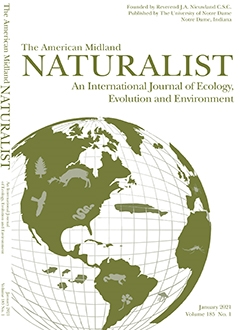Forests with an old-growth Pinus strobus (white pine) component are rare in the Upper Midwest. I established 9.5 ha of permanent plots at five sites in mature mixed forests of northern Wisconsin and Upper Michigan to study late-successional dynamics, with emphasis on P. strobus demography and reproduction. This manuscript includes the first description of this network of permanent plots, the data of which are archived for potential use by forest managers and ecologists. Pinus strobus exhibited a variety of size distributions within 13 plots, indicative of its versatile role in stand composition and succession. Three plots exemplified a “classic” unimodal P. strobus size distribution of large emergent trees within an old-growth mixed stand. However, most plots contained an atypical bimodal distribution of P. strobus, consisting of saplings and large trees. Other plots approximated a negative exponential curve of continual recruitment or exhibited an influx of P. strobus saplings into hardwood-dominated stands. The recent P. strobus reproduction may indicate a reversing successional trajectory from hardwoods to P. strobus, which is opposite to reported regional trends of mesophication or mapleization in these mixed mesic forests. Differential deer browsing that inhibits hardwood regeneration is hypothesized as a driver for this counter trend. Overall, the 13 plots illustrate the ecological breadth of P. strobus and suggest a complexity of successional patterns.
How to translate text using browser tools
11 January 2021
The Versatile Role of Pinus strobus Within the Composition and Structure of Permanent Plots in Five Mature Mixed Forests of the Upper Midwest U.S.A.
Dennis A. Riege
ACCESS THE FULL ARTICLE
It is not available for individual sale.
This article is only available to subscribers.
It is not available for individual sale.
It is not available for individual sale.





